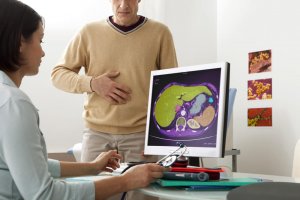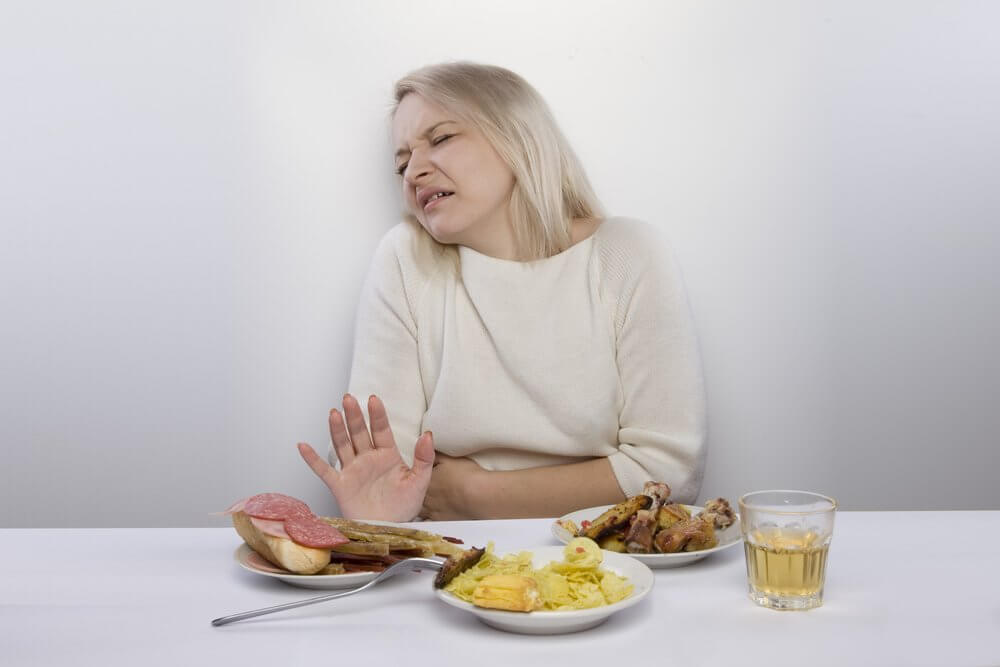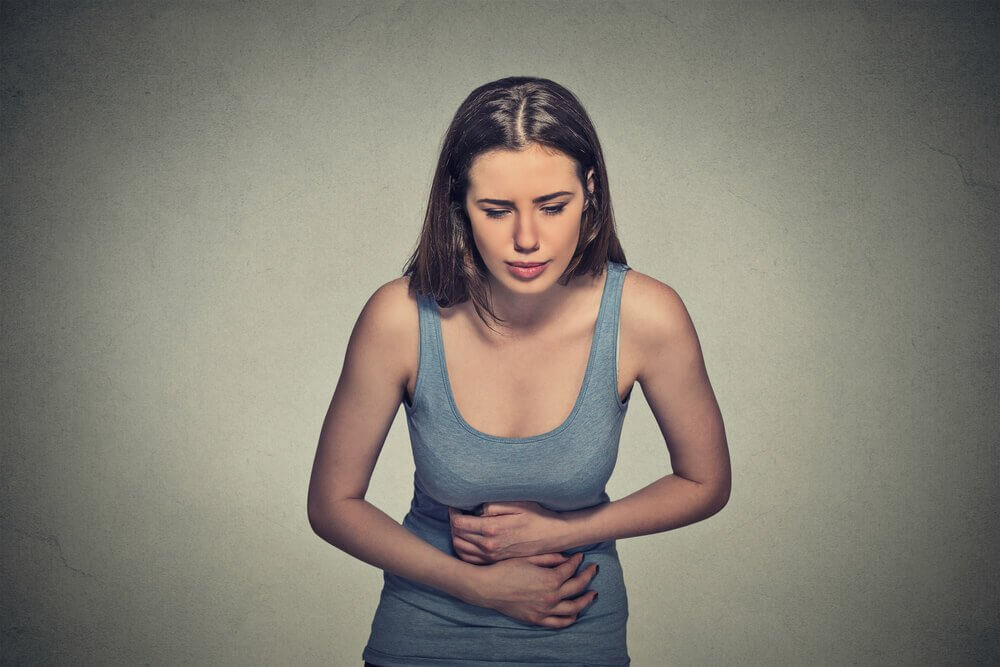Why Do I Experience Stomach Pains?


Written and verified by the doctor Maricela Jiménez López
Have you ever felt stomach pains? They can be very annoying and can have different types of origin.
Stomach pain, or ailments in the abdominal area may be due to organic, digestive, intestinal dysfunctions, inflammatory or infectious causes. They can also occur in women as a result of premenstrual syndrome.
When these discomforts are recurrent, it’s important to visit a specialist who can examine you to make an accurate diagnosis and provide you with the appropriate treatment. That way you can improve your quality of life.
Here are some guidelines for you to know the possible causes of pain in the abdominal area, and some tips that could help you.
Types of pain
What we commonly know as stomach pain is discomfort originating from the abdomen. We can classify them as follows:
- Localized. You feel the pain in only one part of your abdomen. It’s possible that it could be a problem with your gallbladder or appendix or stomach.
- Generalized. You feel the pain in more than half of your stomach, and usually originates from a virus, gas, or indigestion.
- Cramps. This discomfort is generally not serious and is due to gases and bloating. If the discomfort lasts for more than 24 hours and is accompanied by fever, then it may be something more complex.
- Colic. This is an intense sudden pain, and it usually comes and goes. Kidney and gallstones are common causes of this type of abdominal pain.
Also read: 7 Reasons You Might Feel Pain in Your Ovaries
Possible causes of stomach pain
Food poisoning

Food poisoning occurs when the food or water that we ingest have germs or a toxic substance that directly attacks your body.
The symptoms of food poisoning vary depending on the cause of the food contamination. In general there are symptoms such as nausea, vomiting, diarrhea, pain and punctures in the belly, gases, and fever.
Irritable bowel syndrome
Irritable bowel syndrome affects the large intestine, and can cause abdominal cramping, bloating, gas and changes in bowel habits. Some people have constipation, others have diarrhea, and others can have both.
As noted by the National Institute of Diabetes and Digestive and Kidney Diseases in the United States, doctors can treat irritable bowel syndrome by recommending changes in diet and lifestyle. In addition, they can prescribe medicines, probiotics and psychological therapies. Generally, each patient can find the most appropriate treatment plan with their doctor’s help.
Appendicitis

The pain is not as strong at the start, but it can go from low to severe, with an increase in temperature, vomiting, nausea and abdominal swelling.
Since the appendix doesn’t currently appear to have a specific purpose in the human body, if the pain intensifies and inflammation is diagnosed, then the treatment will be surgery to remove the inflamed appendix.
We recommend you read: 6 Appendicitis Symptoms That You Shouldn’t Ignore
Ectopic pregnancy
This condition happens when the fertilized egg implants itself outside of the uterus, generally in the Fallopian tubes. The pregnancy continues but can cause the following:
- Abnormal vaginal bleeding
- Slight colic on the left side of your pelvis
- Menstruation stops
- Pain in the lower part of the abdomen
Some experience vaginal bleeding and others don’t, but the pain starts suddenly. The pains become very sharp and persistent.
There are people who experience vaginal bleeding and others that don’t, but the stomach pains can be sudden.
If the area around the womb ruptures and bleeds then symptoms can worsen. It’s important to go to hospital immediately, because if an ectopic pregnancy isn’t treated in time then the consequences can be fatal for the mother.
Pancreatitis

The pancreas is an organ located behind the stomach, in the upper part of the abdomen. When your pancreas becomes inflamed, you can experience a sensation of burning and stomach pains in the upper or middle part of your stomach. Pancreatitis creates oppressive pain, and the main symptom is several episodes of vomiting. As it’s an acute process, you won’t show any weight loss.
The discomfort can be unexpected and even disappear in a few days. It can also become chronic, and affect you for years. Consult your doctor if you feel the following symptoms in addition to the pain in your stomach:
- Tenderness in the abdomen
- Pain that increases after eating
- Tachycardia
- Vomiting
- Nausea
- Fever
- Pain that extends to the back
Diverticulitis
Small protrusions that form in the inner lining of the digestive system, most often in the lower part of the large intestine (colon), are called diverticula. In general, they don’t cause problems. However, sometimes they can become inflamed or infected.
In that case, diverticulitis occurs, which is more common in people over 50 years old. Diverticulitis can cause severe abdominal pain, fever, nausea and changes in bowel habits. While mild diverticulitis can be treated with rest, dietary changes and antibiotics, in more severe cases it may require surgery.
Endometriosis

Although there’s no cure for endometriosis, there are treatments to relieve pain and treatments for infertility related to endometriosis.
Recommendations
In order to prevent stomach pains as well as treat them, the most recommendable thing is to:
- Chew your food slowly to let your digestive tract do its job properly.
- Avoid going to bed when you have stomach pain; the best thing to do is sit up and stretch out your legs.
- Avoid eating greasy or heavily seasoned food.
- Exercise at least 3 times per week.
- Reduce your consumption of alcohol and cigarettes.
- Eat 5 meals a day.
- Increase your consumption of water.
In summary
Stomach pains, or any type of ailment in the abdominal region is a symptom that shouldn’t be overlooked. Although sometimes it arises from an indigestion problem, it can also alert us to more serious conditions such as irritable bowel syndrome and endometriosis.
It’s essential to see a doctor for this type of discomfort, because he or she is responsible for determining its cause and possible treatments. In addition to this, some changes in lifestyle and diet will be very helpful.
All cited sources were thoroughly reviewed by our team to ensure their quality, reliability, currency, and validity. The bibliography of this article was considered reliable and of academic or scientific accuracy.
- Iglesias Rosado C., Villarino Marín A. L., Martínez J. A., Cabrerizo L., Gargallo M., Lorenzo H. et al . Importancia del agua en la hidratación de la población española: documento FESNAD 2010. Nutr. Hosp. [Internet]. 2011 Feb [citado 2022 Dic 14] ; 26( 1 ): 27-36. Disponible en: http://scielo.isciii.es/scielo.php?script=sci_arttext&pid=S0212-16112011000100003&lng=es.
- Roldán J., Frauca C., Dueñas A.. Intoxicación por alcoholes. Anales Sis San Navarra [Internet]. 2003 [citado 2022 Dic 14] ; 26( Suppl 1 ): 129-139. Disponible en: http://scielo.isciii.es/scielo.php?script=sci_arttext&pid=S1137-66272003000200007&lng=es.
- National Institute of Health. Sobre la endometriosis. Disponible en: https://espanol.nichd.nih.gov/salud/temas/endometri/informacion.
- Shah AP, Mourad MM, Bramhall SR. Acute pancreatitis: current perspectives on diagnosis and management. J Inflamm Res. 2018 Mar 9;11:77-85. doi: 10.2147/JIR.S135751. PMID: 29563826; PMCID: PMC5849938.
- Urrutia S María Teresa, Poupin B Lauren, Alarcón A Paula, Rodríguez C Magdalena, Stuven R Loreto. EMBARAZO ECTÓPICO: FACTORES DE RIESGO Y CARACTERÍSTICAS CLÍNICAS DE LA ENFERMEDAD EN UN GRUPO DE MUJERES CHILENAS. Rev. chil. obstet. ginecol. [Internet]. 2007 [citado 2022 Dic 14] ; 72( 3 ): 154-159. Disponible en: http://www.scielo.cl/scielo.php?script=sci_arttext&pid=S0717-75262007000300004&lng=es. http://dx.doi.org/10.4067/S0717-75262007000300004.
- González J, et al. Peritonitis agudas. Medicine 2000;8(8):377-385. Disponible en: https://www.sciencedirect.com/science/article/pii/S0304541200700758.
- National Institute of Health. Síndrome del intestino irritable. Disponible en: https://www.niddk.nih.gov/health-information/informacion-de-la-salud/enfermedades-digestivas/sindrome-intestino-irritable.
- Esquena S., Millán Rodríguez F., Sánchez-Martín F.M., Rousaud Barón F., Marchant F., Villavicencio Mavrich H.. Cólico renal: Revisión de la literatura y evidencia científica. Actas Urol Esp [Internet]. 2006 Mar [citado 2022 Dic 14] ; 30( 3 ): 268-280. Disponible en: http://scielo.isciii.es/scielo.php?script=sci_arttext&pid=S0210-48062006000300004&lng=es.
- Ramos Zabala F., Moreno Almazán L.. Meteorismo. Rev. esp. enferm. dig. [Internet]. 2005 Feb [citado 2022 Dic 14] ; 97( 2 ): 137-137. Disponible en: http://scielo.isciii.es/scielo.php?script=sci_arttext&pid=S1130-01082005000200009&lng=es.
- Quevedo Guanche Lázaro. Apendicitis aguda: clasificación, diagnóstico y tratamiento. Rev Cubana Cir [Internet]. 2007 Jun [citado 2022 Dic 14] ; 46( 2 ). Disponible en: http://scielo.sld.cu/scielo.php?script=sci_arttext&pid=S0034-74932007000200011&lng=es.
- Harmon RC, Peura DA. Evaluation and management of dyspepsia. Therap Adv Gastroenterol. 2010 Mar;3(2):87-98. doi: 10.1177/1756283X09356590. PMID: 21180593; PMCID: PMC3002574.
- Clínica Mayo. Intoxicación alimentaria. Disponible en: https://www.mayoclinic.org/es-es/diseases-conditions/food-poisoning/symptoms-causes/syc-20356230.
- MedlinePlus. Síndrome premenstrual. Disponible en: https://medlineplus.gov/spanish/ency/article/001505.htm.
This text is provided for informational purposes only and does not replace consultation with a professional. If in doubt, consult your specialist.








